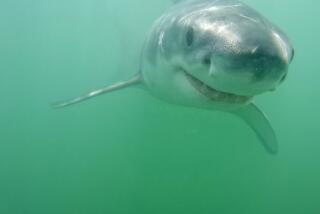The Blue Shark: Perfection Pays a Price
Off the coast of California, where the Pacific glimmers dark and deep and the noise of cities is left far behind, the blue shark is lord. I have often been diving when they circle around me, expressionless, curious but unaggressive.
Little was known about the cold-blooded shark’s behavior in the late 1960s, when I designed an apparatus called the “squaloscope,” a plastic and aluminum cage that we deployed underwater. We lured sharks inside with bait, then observed them. However, we soon learned that some sharks required unlimited domain to survive because, unlike most other fish, these sharks drew oxygen from seawater only if the water rushed at great speed through their gills. They must, therefore, swim without obstacle or they will asphyxiate. Their anatomies govern their constant prowl of the seas.
Since then, we have learned much more. Ancestors of these sleek fish have been in the Earth’s oceans for at least 340 million years, even before the age of the dinosaurs.
A shark’s body, which can grow to a length of 12 feet, is completely cartilaginous, with no bony skeleton. As a result, it leaves little fossilized evidence when it dies, except for its teeth--the attribute for which it is most notorious, teeth that tear back and forth against its prey. However, it is not the shark’s power that has fascinated me. It is its perfection.
The blue shark is fluid grace wrapped in iridescent blue skin, with a snow-white underbelly and a pointed snout to penetrate the water. Cruising at roughly 25 m.p.h., the flawless swimming machine seems to defy its medium, gliding unencumbered.
In full movement, a shark’s skin is unwrinkled. The blue shark’s adaptation to seawater is so magnificently designed that the muscles and tissue under the skin can contract and expand. Why? So there will be little drag, little slowdown during an ease of constant motion--a perfection we cannot duplicate.
However, the blue shark pays a price for its faultlessness: vulnerability. You rarely see a wounded shark in the water. A badly wounded shark is finished, out of the race, as it quickly becomes prey for other sharks and predators. So the blue shark is, in a sense, trapped by its perfection. It can glide. It can speed by. But, like a thoroughbred or race car, blue sharks are so finely tuned that they are very sensitive to incident.
Their sensual capabilities--smell and hearing, for example--are so refined that a shift in the quality of their environment can confuse them, throwing off their hunting instincts and threatening their daily way of living.
Thus, nature makes little accommodation for weak or disabled sharks. Nature demands that they be nearly perfect to survive. But once anything, any species, reaches that pure blue-shark perfection, it becomes dependent on its perfection, and in a way becomes doomed.
Fortunately, we humans can cheat nature. Where nature leaves little room for the weak and wounded and sick, we attempt to care for them; we are dedicated to helping the crippled, the unfortunate, the poor.
Perhaps, as resources are depleted and populations continue to grow, we need a master plan for our destiny--to balance our use of resources more wisely, to conserve, to ensure that in our compassion for all, there will be enough for all.
The shark’s perfection makes its survival possible. But unlike the blue shark, we aim for more than mere survival. We appreciate quality and beauty--a refreshing breeze, the full-toned music of a flute, the delighted innocence of a baby’s laugh, the fresh sparkle of clear water in the sun. These are the rights of all, sensations we seek to share with all.
It is our very imperfection that makes us human, and our humanity is gauged best by how well we take care of the least fortunate and weakest among us.
Nature kills the imperfect shark but bestows on us the twin gifts of intelligence and heart to manage our blessed, if imperfect, world.
More to Read
Sign up for Essential California
The most important California stories and recommendations in your inbox every morning.
You may occasionally receive promotional content from the Los Angeles Times.










